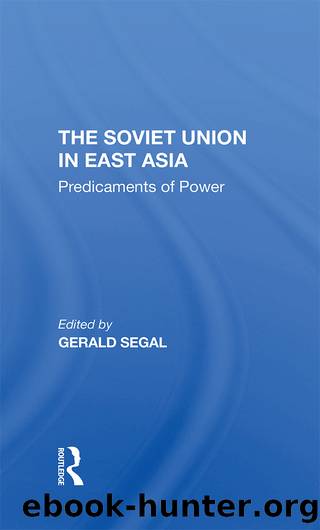The Soviet Union In East Asia by Gerald Segal

Author:Gerald Segal [Segal, Gerald]
Language: eng
Format: epub
ISBN: 9781000305883
Barnesnoble:
Publisher: Taylor & Francis
Published: 2019-07-11T00:00:00+00:00
SinoâSoviet predicaments
Sino-Soviet relations regarding Korea are simpler for the Soviet Union to manage than the superpower relations already discussed. Essentially the problem has been to what extent China's involvement in Korean affairs should be vigorously opposed. No clear-cut solution is apparent.
Chinese involvement in Korea predates that of the Soviet Union, and even before Soviet troops occupied northern Korea, Chinese and Soviet factions were fighting for the leadership of the Korean Communist Party. While it would be an error to 'read back' deep conflict when none existed during the Sino-Soviet honeymoon, it is important to state that tension between the communist giants over Korea has deep roots.24 These problems were outweighed at the time by the need to unite against a common enemy and establish the DPRK. Thus tension and cooperation coexisted, with no one, including Stalin, judging it worth risking the revolution for the sake of partisan interests.
The same pattern is evident during the Korean War itself. The use of Chinese troops across the Yalu was clearly in the Soviet interest as it helped prop up Kim Il-sung. The predicament for Moscow was how much it should help build up Chinese influence in Korea by supporting the Chinese military operation. In the end the Soviets seemed to opt for a 'short-tether' policy, whether by choice or because of lack of political and economic resources.25 The Soviet Union was a contributory rather than a decisive factor in the Chinese decision to intervene, and Moscow was well aware of the secret pact between the Chinese and Korean communist parties, signed in Moscow in 1949 and providing for mutual security. (No similar treaty was signed between Kim and the Soviet Union.)26 But while Stalin lived, and Sino-Soviet relations were relatively close, Beijing's relative independence was not a problem for Moscow. China and Korea lacked any alternative option during the war and so they relied on Soviet support and made do with the equipment provided. Official Soviet accounts of the war minimized China's role, but in the essential crisis management China and the United States were squared off while Moscow protected its own national security.27 As the war wound down the Soviet attention shifted back to Europe, Sino-Korean relations emerged from the war much warmer than Soviet-Korean ties. However, as all were members of the same bloc, this seemed a price worth paying for the Soviet Union's broader foreign policy objectives.
The problems became more acute for the Soviet leadership with the onset of de-Stalinization by Khrushchev. The Stalin question in Pyongyang, as in Beijing, deepened policy cleavages and in the DPRK the Soviet ambassador was implicated in convoluted Korean factional struggles against Kim Il-sung.28 As the Sino-Soviet split deepened, Korea seemed to be just a few paces behind China in opposing what was becoming known as 'revisionism', China's contentious Great Leap Forward was matched by Korea's Flying Horse Movement, and Beijing's opposition to 'peaceful coexistence' with the United States found sympathy in Pyongyang. China, like Korea, had irredentist claims against a US-supported state. This,
Download
This site does not store any files on its server. We only index and link to content provided by other sites. Please contact the content providers to delete copyright contents if any and email us, we'll remove relevant links or contents immediately.
The European Opportunity by Felipe Fernández-Armesto(570)
The European History Highway: A Guide to Internet Resources by Dennis A. Trinkle Scott A. Merriman(535)
Morgan Kaufmann Digital Watermarking and Steganography by Ingemar Cox Matthew Miller Jeffrey Bloom Jessica Fridrich Ton(529)
The Seven Wonders of the Ancient World by Michael Denis Higgins(521)
Hyperculture by Byung-Chul Han(511)
European Security without the Soviet Union by Stuart Croft Phil Williams(508)
European Security in a Global Context by Thierry Tardy(507)
The Routledge companion to Christian ethics by D. Stephen Long Rebekah L. Miles(499)
Get Real with Storytime by Julie Dietzel-Glair & Marianne Crandall Follis(444)
Hudud Al-'Alam 'The Regions of the World' - a Persian Geography 372 A.H. (982 AD) by V. V. Minorsky & C. E. Bosworth(438)
Tibetan Studies in Comparative Perspective by Chih-yu Shih Yu-Wen Chen(436)
Gorbachev And His Generals by William C. Green(429)
Governance, Growth and Global Leadership by Espen Moe(426)
CliffsNotes on Fitzgerald's The Great Gatsby by Kate Maurer(410)
How Languages Are Learned 5th Edition by Patsy M Lightbown;Nina Spada; & Nina Spada(408)
The Oxford History of the World by Fernández-Armesto Felipe;(388)
The Egyptian Economy, 1952-2000 by Khalid Ikram(387)
Oral Poetry and Narratives from Central Arabia: The Poetry of Ad-Dindan : A Bedouin Bard in Southern Najd (Studies in Arabic Literature, Vol 17) (English and Arabic Edition) by P. M. Kupershoek P. Marcel Kurpershoek(365)
The Oxford Handbook of the Incas by Sonia Alconini(365)
